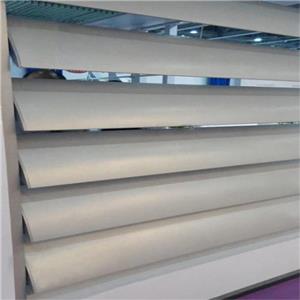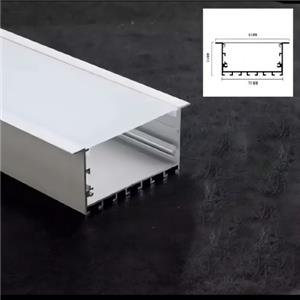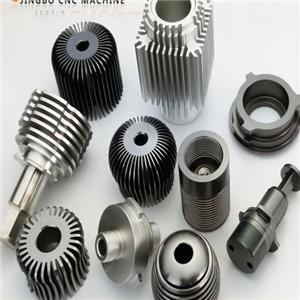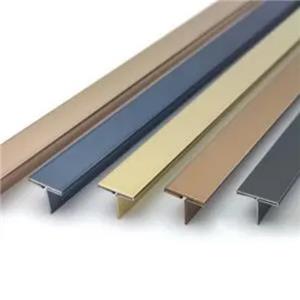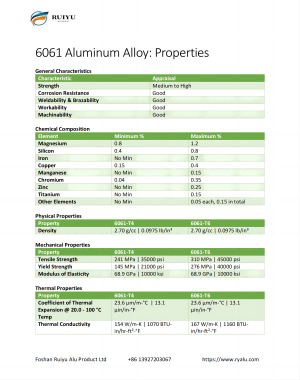6061 Aluminum Alloy:Get to Know its Properties and Uses
One of the important decisions you must make when working on an extrusion project is alloy selection.
You may be considering 6061 aluminum as it is one of the most common extruded alloys. 6061 aluminum alloy was invented by Alcoa in 1933. It is based on the 6061 base alloy by adding magnesium and silicon elements to improve its strength and corrosion resistance. The alloy was subsequently patented by the Alcoa Company in 1933 and quickly found applications in multiple industries.
The invention of 6061 extruded aluminum alloy has significantly improved the practicality of aluminum in structural applications. Its good machining performance, medium strength, and excellent welding performance make it widely used in automobiles, aerospace, rail transit, construction, shipbuilding and other fields. At the same time, 6061 extruded aluminum alloy is often used for anodizing and painting due to its good surface treatment properties to further enhance its appearance and corrosion resistance.
6061 extruded aluminum alloy is a forged alloy, not a cast alloy. Therefore, it can be extruded, rolled or forged into various shapes.
Here Are Some General Characteristics of 6061 Aluminum
6061 aluminum has medium to high strength. It also has good corrosion resistance, weldability, Workability and recyclability.
| Characteristic | Appraisal |
| Strength | Medium to High |
| Corrosion Resistance | Good |
| Weldability & Brazability | Good |
| Workability | Good |
| Recyclability | Good |
Tempering improves its strength and corrosion resistance.
Material Properties of 6061-T4 and 6061-T6 Aluminum
Generally, 6061 aluminum is solution heat treated and then aged. T4 tempered aluminum is naturally aged and T6 tempered aluminum is artificially aged for maximum strength.
The alloy in the 6061-T6 temper has higher strength and hardness, but its ductility and formability are worse than those in the T4 temper.
In summary, the choice between 6061-T4 and 6061-T6 depends on the specific application requirements. If better formability and a certain strength are required, the T4 state can be selected; if higher strength and hardness are required, such as in structural components or load-bearing parts, the T6 state will be selected.
Physical Properties of 6061 Aluminum
Here we can see the density of the alloy. Note that there is no difference in density between T4 and T6 tempers.
| Property | 6061-T4 | 6061-T6 |
| Density | 2.70 g/cc | 0.0975 lb/in³ | 2.70 g/cc | 0.0975 lb/in³ |
Mechanical Properties of 6061 Aluminum
Here we can see the tensile strength, yield strength and elastic modulus for T4 and T6 tempers.
| Property | 6061-T4 | 6061-T6 |
| Tensile Strength | 241 MPa | 35000 psi | 310 MPa | 45000 psi |
| Yield Strength | 145 MPa | 2100 psi | 276 MPa | 40000 psi |
| Modulus of Elasticity | 68.9 GPa | 10000 ksi | 68.9 GPa | 10000 ksi |
Thermal Properties of 6061 Aluminum
Here we can see some of the thermal properties of the alloy, including coefficient of thermal expansion and thermal conductivity. Includes T4 and T6 tempers.
| Property | 6061-T4 | 6061-T6 |
Coefficient of Thermal Expansion @ 20.0 - 100 °C Temp | 23.6 µm/m-°C | 13.1 µin/in-°F | 23.6 µm/m-°C | 13.1 µin/in-°F |
| Thermal Conductivity | 154 W/m-K | 1070 BTU-in/hr-ft²-°F | 154 W/m-K | 1070 BTU-in/hr-ft²-°F |
NOTE: The material properties above are extracted from Matweb, here and here . Please note that they cannot be 100% verified.
Now, you might be wondering what 6061 alloy is made of.
Chemical Composition of 6061 Aluminum
This alloy is part of the 6000 series alloys. Therefore, its main alloying elements are magnesium and silicon. Magnesium is added to increase strength, while silicon is added to lower the metal's melting temperature. Here we can see a guide to the chemical composition of 6061 Aluminum.
| Element | Minimum | Maximum |
| Mg | 0.8 | 1.2 |
| Si | 0.4 | 0.8 |
| Fe | No Min | 0.7 |
| Cu | 0.15 | 0.4 |
| Mn | No Min | 0.15 |
| Cr | 0.04 | 0.35 |
| Zn | No Min | 0.25 |
| Ti | No Min | 0.15 |
| Other Elements | No Min | 0.05 each 0.15 in total |
Now that we understand the chemical composition of 6061, let's talk about how this alloy compares to some other key options.
Comparing 6061 Aluminum to Other Alloys
6061 extruded aluminum is one of the most common extrusion alloys, but you may be considering other options for your specific application. Here are some other common alloys that are often considered alternatives.
6061 vs 7075
7075 aluminum alloy is a commonly used aerospace grade aluminum alloy that contains higher zinc and magnesium content, which gives it greater strength and hardness. Therefore, in applications that require higher strength and fatigue resistance, such as aircraft structural components, 7075 aluminum alloy may be a better choice. However, these added alloying elements also result in lower corrosion resistance than 6061 aluminum alloy, poor ductility and weldability. Therefore, in applications requiring good formability and weldability, 6061 aluminum alloy may be more suitable. |  |
6061 vs 6063
6061 and 6063 are two of the most popular extrusion alloys. 6063 extruded aluminum occupies the first place, and 6061 extruded aluminum occupies the second place. As 6000 series alloys, they all contain magnesium and silicon as the primary alloying elements. Therefore, they share many similar properties. 6061 extruded aluminum is widely used in automotive parts, aerospace structures, mold manufacturing and other fields due to its high strength and good processing properties. The 6063 extruded aluminum is commonly used in applications such as architectural aluminum profiles, decorative materials, door and window frames, etc. that require high aesthetics and formability. In summary, 6061 extruded aluminum and 6063 extruded aluminum each have their own advantages. Which material to choose depends on the priority of strength, processability, corrosion resistance and other characteristics required by the specific application. | 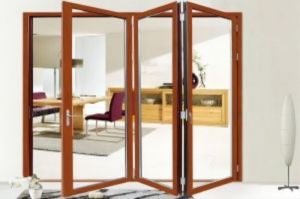 |
6061 vs 2024
2024 alloy is primarily used in aerospace applications and is known for its high strength. Its main alloying element is copper. Although it has high strength and good fatigue resistance, it is more difficult to process and weld than 6061extruded aluminum. It also has poor corrosion resistance and is typically used on wing and fuselage structures that are subject to high tensions. | 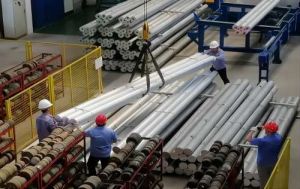 |
6061 vs 304 Stainless Steel
In construction and other industrial fields, 6061 extruded aluminum and 304 stainless steel are often compared with each other. 304 stainless steel has good corrosion resistance and toughness and is widely used in food processing, chemical production and one of the preferred materials in the construction industry. Compared with 6061 aluminum alloy, 304 stainless steel does show better corrosion resistance and high temperature endurance. However, due to the higher density of stainless steel and poor thermal conductivity, 6061 aluminum alloy may have more advantages in terms of weight and thermal conductivity. Additionally, although 304 stainless steel can be strengthened by cold working, it is not as work-hardenable as 6061 extruded aluminum, which means the latter is easier to handle in situations where extensive machining is required. Stainless steel is typically more expensive than aluminum alloys from a cost perspective, so the decision to use a material must be weighed against the performance, processing characteristics and budget required for the application. | 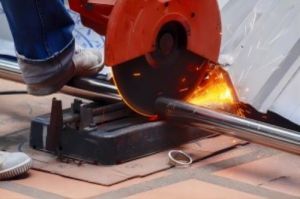 |
Summary
6061 aluminum alloy is a very competitive choice in many applications due to its balanced properties, good processability and cost-effectiveness. However, in a given environment, other more suitable alloys may be chosen based on priorities such as strength, corrosion resistance, weight or cost.
Download our PDF on the properties of 6061 aluminum for reference.
Download 6061 Aluminum Properties PDF
General characteristics, properties, and chemical composition of 6061 aluminum.
![]() 6061-Aluminum-Alloy-Properties-1.pdf
6061-Aluminum-Alloy-Properties-1.pdf

